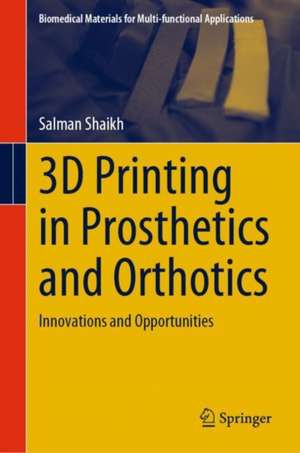3D Printing in Prosthetics and Orthotics: Innovations and Opportunities: Biomedical Materials for Multi-functional Applications
Autor Salman Shaikhen Limba Engleză Hardback – 23 sep 2024
Preț: 1030.44 lei
Preț vechi: 1084.67 lei
-5% Nou
Puncte Express: 1546
Preț estimativ în valută:
197.19€ • 204.63$ • 164.82£
197.19€ • 204.63$ • 164.82£
Carte tipărită la comandă
Livrare economică 17-31 martie
Preluare comenzi: 021 569.72.76
Specificații
ISBN-13: 9789819749126
ISBN-10: 9819749123
Pagini: 150
Ilustrații: Approx. 150 p.
Dimensiuni: 155 x 235 x 15 mm
Greutate: 0.4 kg
Ediția:2024
Editura: Springer Nature Singapore
Colecția Springer
Seria Biomedical Materials for Multi-functional Applications
Locul publicării:Singapore, Singapore
ISBN-10: 9819749123
Pagini: 150
Ilustrații: Approx. 150 p.
Dimensiuni: 155 x 235 x 15 mm
Greutate: 0.4 kg
Ediția:2024
Editura: Springer Nature Singapore
Colecția Springer
Seria Biomedical Materials for Multi-functional Applications
Locul publicării:Singapore, Singapore
Cuprins
Chapter 1: Introduction: The history and evolution of 3D printing in healthcare.- Chapter 2: 3D printing technologies and materials for prosthetic and orthotic devices.- Chapter 3: 3D scanning and design methods for personalised and customised solutions.- Chapter 4: 3D printing in surgical planning: 3D Reconstruction and Surgical Guides.- Chapter 5: 3D printing in orthopaedic implants: Design, Materials, Application.- Chapter 6: 3D printing applications in lower limb prosthetics: Sockets, Knee Joint and Foots.- Chapter 7: 3D printing applications in upper limb prosthetics: Hand and Finger prosthesis.- Chapter 8: 3D printing applications in orthotic braces: Upper Body and Lower Body.- Chapter 9: 3D printing applications in orthotic insoles: Asymptomatic, Diabetic and Sports users.- Chapter 10: Clinical outcomes and patient satisfaction of 3D printed prosthetic and orthotic devices.- Chapter 11: Challenges and opportunities for 3D printing in prosthetic and orthotic practice.- Chapter 12: Future trends and innovations in 3D printing for prosthetic and orthotic devices.- Chapter 13: Conclusion: The impact and potential of 3D printing in prosthetic and orthotic care.
Notă biografică
Dr. Salman Shaikh is an experienced Orthopaedic Rehabilitation Consultant associated with various hospitals in Pune and Mumbai. He has previously worked as Assistant Professor at Pune University and MIT-School of Bioengineering Sciences and Research, Pune. He continues to be a visiting faculty and mentor at Wadhwani Foundation, Centre for Healthcare Entrepreneurship (IIT Hyderabad) and various engineering and management colleges across India. He obtained his B.E. in electronics engineering from Pune University, M.Tech. in biomedical engineering from Manipal University, Ph.D. from Symbiosis International University, Pune, and Executive Education in Entrepreneurship, Maha60, from Cornell University. Dr. Salman has research interests and expertise in rehabilitation, biomechanics, rapid prototyping, and product development. His research work has been published in reputed international journals in engineering and healthcare. Through his work with Maha60, Dr. Salman is serving as a consultant in drafting the current industrial policy of the government of Maharashtra in India.
Textul de pe ultima copertă
The subject focuses on the 3D printing applications in rehabilitation industry. It presents a detailed comparative analysis between the conventional methods and digital manufacturing process and materials. It covers the wide area of application of 3D printing in prosthetics and orthotics industry, covering invasive as well as non-invasive applications. This technology has the potential to revolutionize the way prosthetics and orthotics are designed and manufactured. This book, being interdisciplinary in nature, can greatly benefit students from various disciplines in science, design and engineering and technology field. The book highlights the applications of 3D printing and uses a combination of modernized teaching and didactic approach. The readers can gain a deeper understanding of the subject matter and learn about the latest developments and techniques in the field of digital manufacturing. This book also provides practical information and instructions that are necessary for application-related design consideration and helps the reader apply their knowledge in real-world situations. This book will help readers in developing critical thinking and problem-solving skills for engineering applications in healthcare, as 3D printing provides unique-customized solutions. Additionally, it can serve as valuable reference for professionals and students interested in applications of 3D printing in rehabilitation industry.
Caracteristici
Includes application-oriented approach with real world examples Compilation of highly interdisciplinary data in one book Suitable for versatile target audience in healthcare ecosystem






